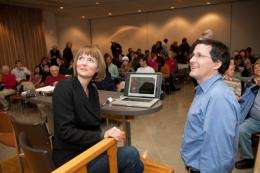Physicists: Did neutrinos break the speed of light?

(PhysOrg.com) -- The revolutionary news that an experiment measured particles traveling faster than the speed of light drew varied ages and backgrounds to a standing-room only physics department forum, "Faster Than the Speed of Light?," in Clark Hall at the Cornell University Nov. 17.
The experiment that triggered the excitement was simple: Scientists at the CERN accelerator in Switzerland fired a beam of neutrinos 730 kilometers through the mountains to the underground Gran Sasso Laboratory in Italy and its enormous OPERA neutrino detector.
Neutrinos are expected to travel extremely close to the speed of light and would make it to Gran Sasso in 2.4 milliseconds, the time it takes a fly to flap its wings once, said Julia Thom-Levy, assistant professor of physics -- but the observation showed that they were 60 nanoseconds faster than light could have traveled.
Researchers calculated the speed by measuring the time difference between the neutrinos' departure from CERN and their detection in OPERA, with an accuracy within 1 nanosecond. Experimenters used a GPS satellite system, refined with Cesium clocks, for the timing, a procedure that is also used in radio astronomy.
But working with neutrinos is extremely difficult. Independent experimental confirmation is needed and will be provided by a similar neutrino experiment in the United States over the next few years. If OPERA's observation of neutrino speed is correct, said physics professor Eanna Flanagan, it presages a physics revolution and requires a new theoretical framework.
In the two months since the OPERA results were posted on the scientific database arXiv, more than 100 papers have offered explanations. But none of them satisfied physics professor Yuval Grossman. "Physics becomes more compact and more beautiful as we unify forces, and these explanations would make physics uglier," he said.
However, Grossman noted that while the commonly held understanding is that no object can travel faster than the speed of light in a vacuum (186,282 miles per second), what general relativity actually says is that there is a maximum velocity beyond which nothing can go. Since nothing has ever out-raced light, its speed has been assumed to be the maximum possible velocity. But what if neutrinos are faster?
"The laws of physics wouldn't change, only the universal constant," said Grossman.
One of the strongest arguments against OPERA's results is their conflict with the measurement of neutrinos emitted by Supernova 1987A. If neutrinos really traveled faster than the speed of light, the supernova's neutrinos should have arrived in 1983, not 1987.
But as one audience member pointed out, perhaps they did arrive in 1983 and no one noticed. Or perhaps the discrepancy of results is because OPERA's neutrinos traveled through solid rock, not the vacuum of space.
Still, while some current theories, such as those suggesting extra dimensions, might be able to incorporate neutrinos going faster than the speed of light, Grossman contended that they couldn't explain the amount of speed seen with OPERA.
Last month, OPERA researchers repeated the experiment with shorter neutrino bursts to eliminate one possible cause of experimental error; the neutrinos still arrived faster than they should have. The researchers subsequently submitted their paper to the peer-reviewed Journal of High Energy Physics. After the forum, many of the more than 150 attendees lingered, talking enthusiastically in small groups. Because despite all the reasons OPERA's results could be wrong, as one audience member said, "in physics, we never say we know anything absolutely because although it might have a low probability, that probability is not zero."
Provided by Cornell University




















